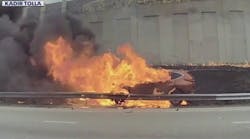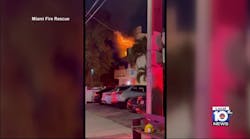From Oct. 23 through 25, 1996, a group of 21 fire-rescue service officials gathered in Dothan, AL, to continue the long-running tradition of addressing issues of national significance. The Dothan Fire Department was the host, with the meetings held in the Chamber of Commerce Building.
The output of the three days of effort is in final draft form. Soon, the "Conference Report" will be ready for widespread distribution. This article provides a sneak preview.
The committee was fortunate to have two outstanding facilitators in the likes of Wayne Powell from the National Fire Academy and Bill Lewis of the Emergency Management Institute. An informative review of Wingspread history was the opening session. Emphasis was placed on Wingspread III because of it was the most recent event and the fact that Phoenix Fire Chief Alan Brunacini and Nancy Trench, director of Fire Service Training at Oklahoma State University, were the only attendees with previous Wingspread experience. These two "senior" members were able to effectively bridge the past to the future and they also served as reference sources.
Setting the stage for the first brainstorming session, Brunacini led the panel in an exercise that tried to profile the American fire-rescue service. The common ground reflected that each organization is different. Further, it was clearly pointed out that volunteer, combination and paid departments would all have separate interests. This fact would make it difficult for the group to prepare a document that would be a "one size fits all." With this point made, the body agreed to take the high ground and keep the meeting on a positive note. Some items that would be recorded would be for one major segment rather than all. The user of the document would be the final judge of its usefulness.
The effort netted 13 statements of national significance. Led by Dr. Denis Onieal, superintendent of the National Fire Academy, the group divided these items into two groups. The classifications selected are "Emerging Issues of National Importance" and "Outgoing Issues of National Importance." Six items are listed as emerging issues. These are new issues that will have an impact on the fire-rescue service. The projection is that these will unfold within a five-year window.
The next classification contained seven items. The group felt these are important but have been identified by other conferences and fire-rescue groups. Little to no progress has been made in most of them, thereby qualifying their restatement in this report.
Emerging Issues
1. Customer Service. The fire service must change its focus from the traditional emphasis on suppression to a focus on discovering and meeting the needs of its customers.
2. Managed Care. Managed care promises to reduce or control health care costs. It will also have a profound impact on the delivery of emergency medical services.
3. Competition and Marketing. In order to survive, the fire service must market itself and the services it provides, showing its customers the value of what it does.
4. Service Delivery. The fire service must have a universally applicable standard that defines the functional organization, operation, deployment and evaluation of public fire protection and emergency medical services.
5. Wellness. The fire service must develop holistic wellness programs to ensure that firefighters are physically, mentally and emotionally healthy and receive the support they need to remain healthy.
6. Political Realities. Fire service organizations operate in political arenas. Good labor/management relations are crucial to ensuring that fire departments have maximum impact on decisions which affect their future.
Ongoing Issues
7. Leadership. To move successfully into the future, the fire service needs leaders capable of developing and managing their organizations in dramatically changing environments.
8. Prevention and Public Education. Fire and emergency services must continue to expand resources allocated to prevention and education activities that have the goal of reducing injuries from fire and other risks.
9. Training and Education. Fire and emergency services managers must increase their professional standing in order to be on an equal footing with their peers in other disciplines. This professionalism should be firmly grounded in an integrated system of nationally recognized and/or certified education and training.
10. Fire and Life Safety Systems. The fire service must support adoption of codes and standards that mandate the use of detection, alarm and automatic fire sprinklers, especially in residential properties.
11. Strategic Partnerships. The fire service must reach out to others to expand the circle of support to assure reaching the goal of public fire protection and other emergency and prevention services.
12. Data. To measure service delivery and achievement of goals, the fire and emergency services should participate in the revised National Fire Incident Reporting System.
13. Environmental Issues. Fire and emergency services must comply with the same federal, state and local laws that apply to general industry.
Watch for a detailed report and regional presentations by attendees. A panel discussion on Wingspread IV will be held at Firehouse Expo '97 in Baltimore July 24-27.
Wingspread IV Participants
Alan V. Brunacini, Chief, Phoenix Fire Dept.
Pat Cantelme, President, United Phoenix Fire Fighters Local 493
Rich Duffy, Director of Health and Safety, International Association of Fire Fighters
Harvey Eisner, Editor-in-Chief, Firehouse Magazine
Dr. John Granito, Fire Protection Consultant
Raymond E. Hawkins, Director of Client Education and Training, VFIS
Mary Beth Michos, Chief, Prince William County, VA, Fire and Rescue
Bill Neville, Consultant, Neville Associates
Dr. Denis Onieal, Superintendent, National Fire Academy
James O. Page, Editor, JEMS Communications
Dennis L. Rubin, Chief, Dothan Fire Dept.
Thomas L. Siegfried, Chief (retired), Altamonte Springs, FL, Fire Dept.
Joe M. Starnes, Chief, Sandy Ridge Volunteer Fire Dept., Monroe, NC
Steve Storment, Assistant Chief, Phoenix Fire Dept.
Nancy J. Trench, Director of Fire Service Training, Oklahoma State University
Bruce Varner, Chief, Carrollton, TX Fire Dept.
Recorders:
Mark R. Nugent, Senior Captain, Chesterfield, VA, Fire Dept.
Robert Tutterow, Safety and Logistics Officer, Charlotte, NC, Fire Dept.
Sally Young, Fire Department Planner, Charlotte, NC, Fire Dept.
Facilitators:
William D. Lewis, National Emergency Training Center
R. Wayne Powell, Program Chair, National Fire Academy







